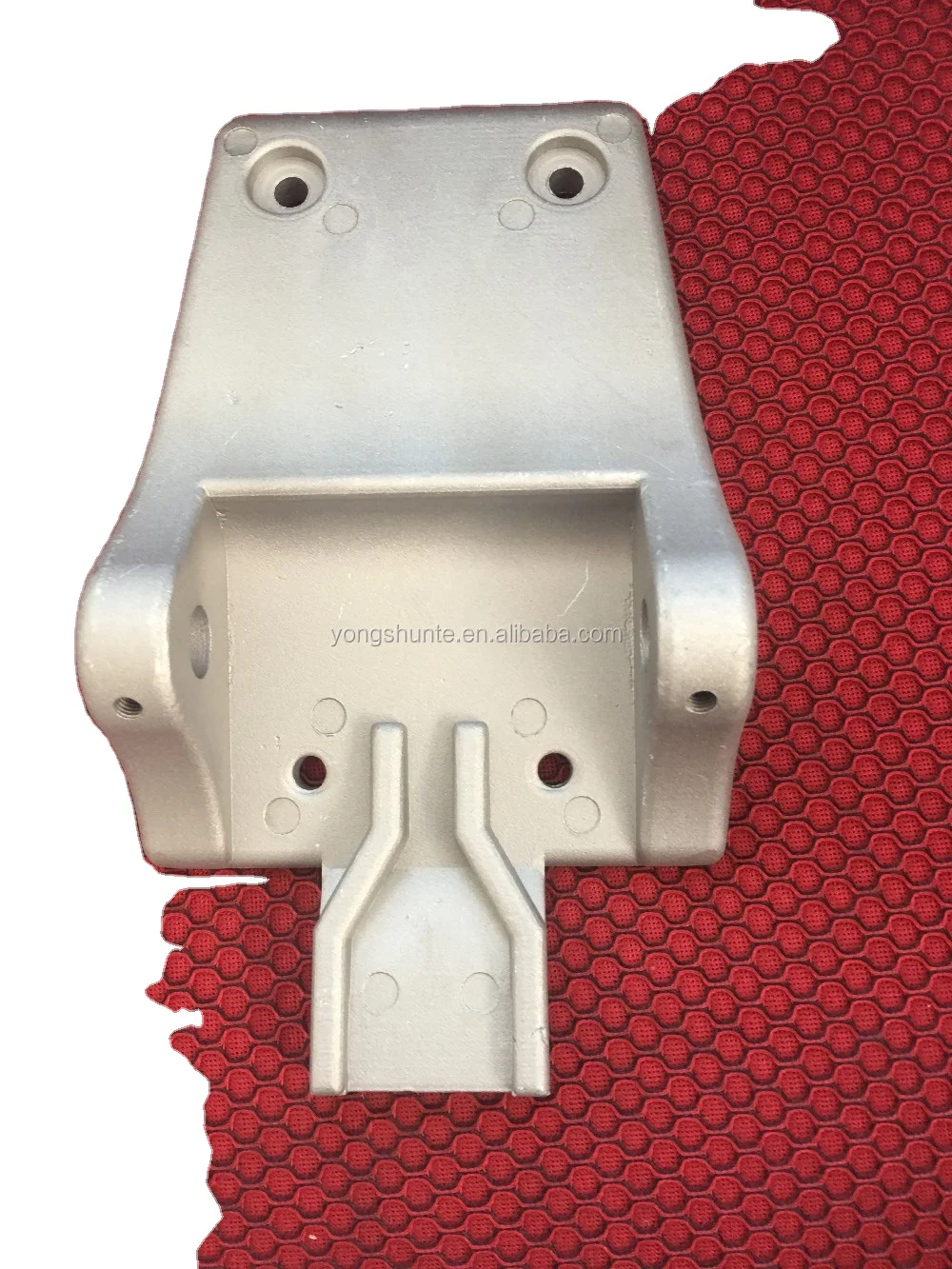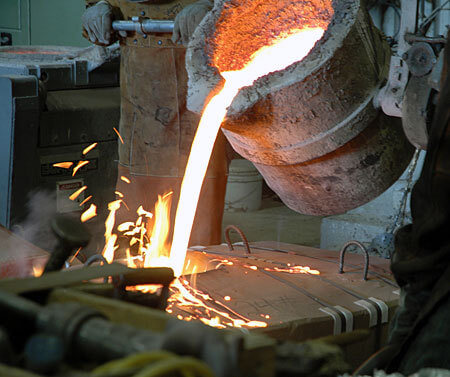Exploring the process behind successful Precision aluminum casting
Wiki Article
The Future of Aluminum Foundries: Advancements and trends Shaping the Industry
The light weight aluminum factory industry is undertaking significant change. Key patterns highlight the significance of sustainability and effectiveness. Advancements in smart production and automation are ending up being widespread. Foundries are progressively concentrated on utilizing recycled products. This change questions concerning future methods and modern technologies. How will these adjustments effect production approaches and market dynamics? The answers might redefine the market landscape in unforeseen methods.Developments in Smart Production Technologies
As the light weight aluminum foundry industry evolves, innovations in clever manufacturing innovations are coming to be progressively necessary for improving performance and efficiency. The assimilation of automation, expert system, and the Internet of Things (IoT) is transforming typical shop procedures. These technologies allow real-time surveillance of processes, enabling for prompt changes that maximize output and decrease waste.Machine learning formulas evaluate manufacturing information to identify patterns and anticipate upkeep needs, reducing downtime. Robotics are significantly utilized for recurring jobs, releasing competent employees to concentrate on even more complicated challenges. In addition, digital twins-- online models of physical procedures-- facilitate simulations that can enhance design and operational approaches.
The fostering of these smart production innovations is driving affordable benefits in the light weight aluminum factory industry. By simplifying workflows and boosting decision-making capabilities, factories can fulfill expanding market demands while keeping premium criteria. The future of light weight aluminum shops is unquestionably connected to these technological technologies.
Welcoming Eco-Friendly Products and Processes
The light weight aluminum factory industry is significantly focusing on environmentally friendly products and procedures to boost sustainability. This change consists of the adoption of sustainable material sourcing, energy-efficient production techniques, and effective recycling and waste administration methods. By integrating these methods, factories aim to minimize their ecological effect while preserving competitiveness in the marketplace.Lasting Product Sourcing
Exactly how can light weight aluminum foundries improve their sustainability initiatives? Sustainable material sourcing has actually emerged as an essential technique in accomplishing this objective. By prioritizing recycled aluminum, shops can significantly decrease their ecological impact, as recycled materials require less power and fewer resources contrasted to primary aluminum production. In addition, sourcing products from accredited providers who adhere to environment-friendly techniques advertises accountable mining and reduces eco-friendly impact. Foundries are likewise checking out alternate materials, such as biopolymers and green finishes, to enhance standard light weight aluminum procedures. Teaming up with stakeholders, consisting of suppliers and environmental companies, cultivates advancement in sourcing techniques. Eventually, accepting lasting material sourcing not only aligns with worldwide sustainability objectives yet also settings light weight aluminum shops as leaders in environmentally accountable manufacturing.Energy-Efficient Production Methods
Light weight aluminum foundries are significantly embracing energy-efficient manufacturing techniques to match their lasting material sourcing initiatives. These techniques concentrate on decreasing energy usage throughout the production process. Advanced innovations, such as induction melting and maximized casting procedures, are being carried out to reduce the general carbon impact. Additionally, automation and smart production systems improve functional performance, enabling much better energy administration. Foundries are also checking out the assimilation of renewable resource sources, such as solar and wind, to power their operations. By prioritizing energy effectiveness, aluminum foundries not just reduced manufacturing prices yet additionally straighten themselves with worldwide sustainability objectives, making certain a more eco accountable approach to light weight aluminum manufacturing while satisfying the increasing need for environment-friendly techniques in the sector.Reusing and Waste Administration
Welcoming eco-friendly products and procedures, light weight aluminum shops are focusing on recycling and waste administration methods to enhance sustainability in their operations. By integrating closed-loop systems, these facilities are reducing waste and taking full advantage of resource efficiency. Scrap light weight aluminum, a readily offered material, is being reused on-site, greatly lowering the requirement for virgin products and reducing energy consumption. Developments in sorting and refining technologies further promote the recycling of aluminum, guaranteeing that also infected materials can be repurposed properly. Additionally, shops are taking on lasting practices such as decreasing dangerous waste and promoting making use of eco-friendly materials for packaging. This commitment to recycling not just decreases ecological effect however also boosts the economic practicality of aluminum factories in an open market.The Duty of Automation and Robotics
Automation and robotics are progressively transforming the light weight aluminum factory sector, significantly boosting manufacturing performance. By incorporating sophisticated modern technologies, foundries can minimize labor expenses while at the same time enhancing security standards for their workforce. This shift not only simplifies procedures but additionally places the sector for lasting growth in an affordable market.Improved Manufacturing Performance
Changing manufacturing processes, the integration of advanced robotics and automation innovations has actually become a keystone for aluminum foundries looking for improved effectiveness. These developments enhance workflows, minimize cycle times, and boost item quality by lessening human mistake. Automated systems can check production lines in real-time, permitting immediate adjustments that optimize output. On top of that, robotics help with the handling of unsafe products, making sure more secure workplace while boosting throughput. Predictive maintenance innovations additionally add to effectiveness by expecting equipment failures, thereby reducing downtime. Consequently, aluminum factories can achieve greater uniformity in their products while responding a lot more swiftly to market demands. This accept of automation is establishing a brand-new criterion for performance and functional excellence within the sector.
Lowering Labor Prices
The shift towards advanced robotics and automation in light weight aluminum foundries not only boosts manufacturing efficiency but also plays a substantial role in reducing labor expenses. By integrating automated systems, foundries can lessen the dependence on manual work, which frequently involves high incomes and training costs. Robotics simplify repeated jobs such as pouring, molding, and finishing, permitting a higher result with fewer employees. This technological change not just decreases labor-related expenses however likewise enhances uniformity and top quality in manufacturing. Automation can run around the Homepage clock, making best use of operational hours without the associated costs of overtime or shift differentials. Therefore, aluminum foundries can accomplish significant savings while preserving affordable rates in an advancing market landscape.Improving Safety And Security Criteria
While conventional light weight aluminum foundry procedures usually subject employees to click over here now hazardous settings, the combination of robotics and automation considerably improves safety and security criteria within the sector. Automated systems can execute risky jobs, such as liquified metal handling and hefty training, lowering human exposure to harmful conditions. Furthermore, robotics can run in poisonous environments and extreme temperatures, efficiently reducing the danger of injury. Advanced monitoring innovations and expert system guarantee real-time security evaluations, allowing for immediate responses to potential risks. Automation streamlines process, minimizing the chance of accidents triggered by human mistake. Consequently, the adoption of these technologies not only boosts safety however likewise fosters an extra productive and efficient working environment in light weight aluminum foundries.Enhancing Energy Effectiveness in Manufacturing
As light weight aluminum shops seek to preserve competitiveness in a developing market, enhancing power performance in manufacturing has emerged as a crucial emphasis. By adopting innovative modern technologies such as high-efficiency melting heaters and automated temperature level controls, foundries can especially minimize energy intake. Implementing real-time surveillance systems permits for accurate tracking of power usage throughout the production process, allowing quick adjustments to maximize performance.In addition, shifting to alternate energy sources, including renewable choices, can further reduce the carbon impact. The combination of energy recovery systems, which reclaim waste warm for reuse, is ending up being significantly usual. Training workers in power management practices ensures that everyone entailed in the manufacturing procedure is mindful of power use.
These initiatives not only reduced operational prices however additionally line up with international sustainability goals, positioning light weight aluminum shops as responsible gamers in the market while improving their overall competition. - aluminum casting
Technologies in Recycling Light Weight Aluminum
Technologies in recycling light weight aluminum have gotten momentum together with efforts to improve additional resources energy effectiveness in production. The aluminum sector has welcomed advanced technologies that improve the reusing procedure, reducing power intake and ecological impact. Methods such as hydrometallurgy and new sorting technologies enhance the extraction of aluminum from scrap, enhancing return prices and guaranteeing better recycled product.
The advancement of closed-loop recycling systems allows foundries to reuse light weight aluminum without substantial degradation in top quality, making the process much more sustainable. Technologies in logistics and collection, consisting of improved monitoring systems and automated sorting, have likewise played an important duty in increasing the efficiency of aluminum healing. These improvements not just add to a circular economic climate but likewise help minimize the carbon footprint connected with aluminum production. As the need for lasting methods expands, these developments place the aluminum shop market as a leader in accountable source monitoring.
Replying To Market Demands and Consumer Trends
Flexibility has come to be a cornerstone for light weight aluminum shops replying to evolving market demands and customer trends. As markets significantly prioritize sustainability, light weight aluminum shops are shifting towards environmentally friendly practices, consisting of enhanced recycling procedures and reduced carbon footprints. This shift lines up with customer preferences for environmentally accountable items, driving factories to innovate their offerings.In addition, the rise of light-weight products in aerospace and vehicle markets demands developments in light weight aluminum alloys and casting methods. Factories are investing in research study and advancement to generate high-strength, lightweight parts that satisfy rigid performance requirements.
Customization has actually acquired traction, with consumers seeking customized solutions. Light weight aluminum shops are leveraging innovative production technologies, such as 3D printing, to fit specific client requirements successfully. This responsiveness not just satisfies customer needs but additionally settings aluminum factories competitively in a dynamic market landscape, ensuring their importance in an ever-changing industrial environment.

Regularly Asked Inquiries
How Do Aluminum Foundries Influence Citizen Economies?
Aluminum shops significantly influence neighborhood economic climates by creating jobs, stimulating need for local suppliers, and adding to area development. Their operations typically cause boosted tax obligation revenues, which can money vital public services and infrastructure renovations.What Are the Safety And Security Regulations for Light Weight Aluminum Factory Workers?
Safety and security policies for aluminum shop employees consist of obligatory personal safety devices, correct air flow systems, normal training on harmful products, and adherence to standards set by work health and wellness and safety managements to minimize threats and warranty worker security. - Aluminum Casting CompanyHow Does Aluminum Recycling Affect Global Supply Chains?
Aluminum recycling substantially minimizes demand for basic materials, enhances resource efficiency, and stabilizes prices. This shift impacts global supply chains by cultivating a circular economic climate, promoting sustainability, and making certain a more durable industry in rising and fall markets.What Profession Opportunities Exist in the Light Weight Aluminum Foundry Market?
Different occupation opportunities exist in the light weight aluminum shop sector, including functions in engineering, top quality control, production management, and research study and advancement. Skilled labor positions such as mold and mildew makers and maker operators are additionally in demand.How Do International Profession Policies Impact Light Weight Aluminum Foundries?
International trade policies substantially influence aluminum foundries by affecting import tolls, supply chain characteristics, and market access. These elements can influence functional costs, competitiveness, and general productivity within the worldwide light weight aluminum production landscape.By prioritizing recycled light weight aluminum, shops can significantly lower their environmental footprint, as recycled products call for much less power and fewer sources contrasted to primary light weight aluminum production. Aluminum factories are increasingly embracing energy-efficient manufacturing strategies to complement their sustainable product sourcing efforts. Automation and robotics are progressively changing the aluminum foundry industry, substantially improving manufacturing efficiency. The shift towards advanced robotics and automation in light weight aluminum shops not only boosts manufacturing efficiency however likewise plays a significant duty in minimizing labor costs. As aluminum shops look for to preserve competitiveness in a developing market, enhancing energy performance in production has arised as a crucial emphasis.
Report this wiki page